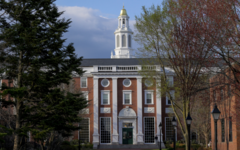Harvard University has initiated a federal lawsuit against the Trump administration, aiming to halt a proposed funding freeze that could jeopardize billions in federal support. This legal action arises from a conflict over recent attempts by the administration to impose demands on the prestigious institution regarding diversity initiatives and policies aimed at combating anti-Semitism.
The lawsuit was filed on Monday following President Trump's decision to freeze $2.2 billion in federal funding and threaten the university's tax-exempt status. Harvard’s president, Alan M. Garber, expressed concern about the long-term repercussions of the government's maneuvers, particularly as they pertain to critical research on diseases such as pediatric cancer and Alzheimer's.
In response to Harvard’s actions, the White House issued a statement criticizing the university's use of federal funds, stating that taxpayer dollars should not support institutions with perceived disregard for accountability. The tension escalated when the administration proposed that Harvard adhere to external audits of its curriculum, hiring, and admission data, a demand the university firmly rejected, insisting on its constitutional rights and independence.
This legal struggle is not isolated; other prominent universities, including Cornell and Brown, have faced similar funding threats. With critical contributions from federal funding playing a significant role in groundbreaking scientific research, this ongoing dispute could have lasting effects on higher education funding and academic governance in the United States.
The lawsuit is further complicated by ongoing societal debates regarding anti-Semitism and diversity on campuses, as Garber recognizes the presence of these issues at Harvard and is working to address them through university-formed task forces. Former President Barack Obama, a Harvard graduate, has expressed his support for the university’s stance in this contentious situation, underscoring the stakes for academic freedom in the face of governmental pressure.
The lawsuit was filed on Monday following President Trump's decision to freeze $2.2 billion in federal funding and threaten the university's tax-exempt status. Harvard’s president, Alan M. Garber, expressed concern about the long-term repercussions of the government's maneuvers, particularly as they pertain to critical research on diseases such as pediatric cancer and Alzheimer's.
In response to Harvard’s actions, the White House issued a statement criticizing the university's use of federal funds, stating that taxpayer dollars should not support institutions with perceived disregard for accountability. The tension escalated when the administration proposed that Harvard adhere to external audits of its curriculum, hiring, and admission data, a demand the university firmly rejected, insisting on its constitutional rights and independence.
This legal struggle is not isolated; other prominent universities, including Cornell and Brown, have faced similar funding threats. With critical contributions from federal funding playing a significant role in groundbreaking scientific research, this ongoing dispute could have lasting effects on higher education funding and academic governance in the United States.
The lawsuit is further complicated by ongoing societal debates regarding anti-Semitism and diversity on campuses, as Garber recognizes the presence of these issues at Harvard and is working to address them through university-formed task forces. Former President Barack Obama, a Harvard graduate, has expressed his support for the university’s stance in this contentious situation, underscoring the stakes for academic freedom in the face of governmental pressure.






















